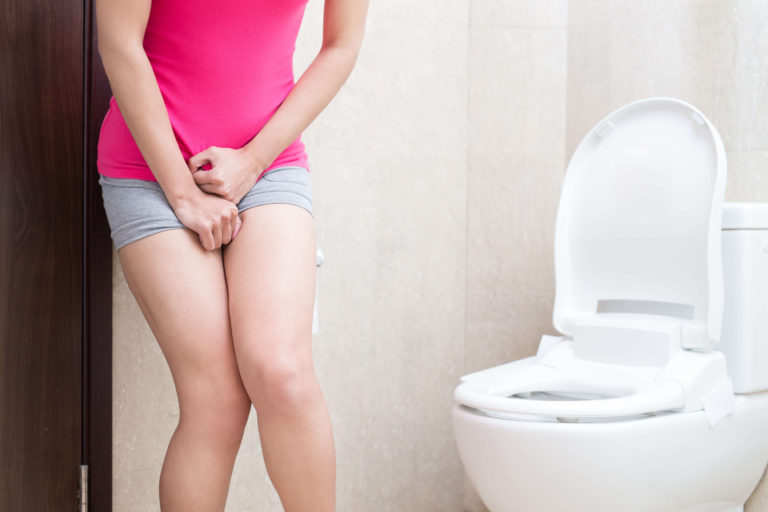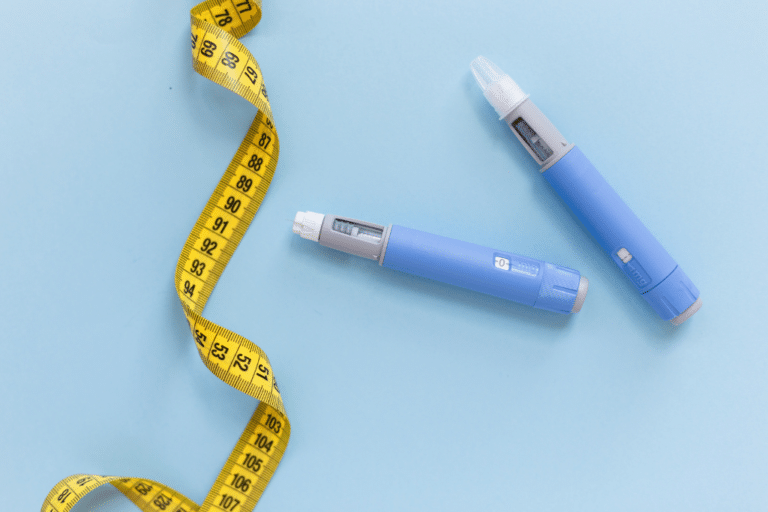Today’s post is part 2 of a 3-part series on what goes on below the belly button during the menopause transition. No one REALLY wants to talk about these things, but it’s important to have this information so you won’t feel like you’re alone or worry yourself to death! Let’s talk about bladder leakage.
If you’re a woman who’s entered perimenopause, you may be noticing that trips to the bathroom are becoming more frequent and less in your control. This can be annoying and embarrassing, especially if you don’t make it quite in time! Marketers would have you believe that Light Bladder Leakage (LBL) is a normal part of aging so they can sell you all kinds of personal hygiene products for it, but I say this is BS! Savvy sisters do NOT settle for peeing in their pants. Nope, they do not.
What’s the connection between perimenopause and that “gotta go right now” feeling?
During perimenopause and menopause, the level of estrogen, which helps to keep the tissues of your bladder and urethra healthy, begins to drop. If you’ve begun to notice dryness and sensitivity during sex, this may be a clue that you’re at risk for bladder problems as well. Just as the tissues of the vaginal wall begin to thin and dry out, so does the tissue that lines the bladder. When that happens, your bladder becomes more sensitive to irritants (like caffeine and spicy foods) and more susceptible to “hair-trigger” releases. Lack of estrogen can also cause the pelvic muscles, which are responsible for maintaining bladder control, to weaken, eventually resulting in leakage. Women who have had hysterectomies may experience these issues to an even greater extent because the surgery itself affects pelvic floor muscles.
What kinds of bladder control problems can happen with menopause?
Overactive bladder problems take several forms:
- Urgency: When you have to go, you have to go NOW. If you’re not near a bathroom, that’s a problem.
- Frequency: You have to go all the time, defined as a problem if you need to go more than eight times in a 24-hour period. This is especially annoying if you have pre-existing issues with insomnia!
- Stress incontinence: that good hard laugh or unexpected sneeze can result in an unwelcomed wetness just when you least expect it.
Natural approaches to managing LBL
The good news is that there are ways to lessen the impact of roller-coaster hormones on your bladder. You might think that systemic hormone replacement therapy would help here, but the data actually suggest it may worsen the situation. Vaginal hormones have also not been proven to be effective. Locally applied DHEA does have data to support its use as it penetrates more deeply than vaginal estrogen. It also improves irritation and pain with intercourse. A win all around! There are over-the-counter and prescription creams and inserts available.
Pelvic floor physical therapists are a great choice for helping manage urine leakage. They teach patients pelvic floor strengthening exercises to address muscle weakness and/or over-activity that contributes to urge incontinence. Research supports the recommendation that pelvic floor therapy be included in first-line conservative management programs for women with stress, urge, or mixed urge incontinence.
Avoiding foods that irritate the bladder, regulating your amount of fluid intake, and increasing your dietary fiber are just a few of the lifestyle changes that can help overactive bladder symptoms. Many foods and drinks contain irritants that, when they collect in the bladder, can cause the bladder muscles to spasm. Those spasms can create the sudden urge to urinate and increase your frequency of urination. Foods to avoid include caffeine, alcohol, spicy foods, honey, citrus, artificial sweeteners, dairy products, and carbonated drinks.
Many women with incontinence suffer in silence and end up feeling isolated and alone. Don’t be one of them! If the tips above don’t work, there are several medications that can help with bladder control, so if you have problems that are beyond annoying and frequent, it’s time to speak up. You have LOTS of company!
—
Dr. Anna Garrett is a menopause expert and Doctor of Pharmacy. She helps women who are struggling with symptoms of perimenopause and menopause find natural hormone balancing solutions so they can rock their mojo through midlife and beyond. Her clients would tell you that her real gift is helping them reclaim parts of themselves they thought were gone forever.
Find out more about working with her at https://www.drannagarrett.com/work-with-me/.




